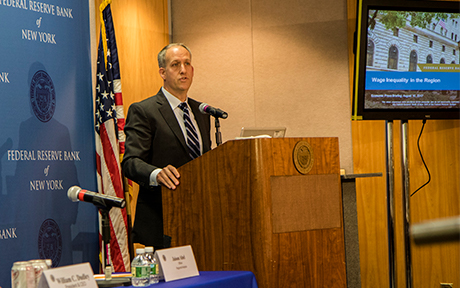The New York-Northern New Jersey region is home to some of the most and least unequal places in the nation, based on research presented today at our economic press briefing examining wage inequality in the region. Wage inequality—meaning the disparity in earnings between workers—has increased significantly in the United States since the early 1980s, though some places have much more wage inequality than others. Fairfield, Conn., for example, ranks as the most unequal metropolitan area in the country, and the New York–Northern New Jersey metropolitan area ranks in the top ten. On the other hand, most of the metropolitan areas in upstate New York are among the least unequal places in the country.
The primary drivers of the rise in wage inequality are technological change and globalization, which have had differential effects on workers throughout the skills distribution. Together, these forces have increased the demand for highly skilled workers, particularly those who create and utilize technology, while simultaneously decreasing the demand for middle and lower skilled workers, many of whom have been displaced by automation or competition from overseas labor. This pattern of demand has raised the wages of highly skilled workers faster than those of lesser skilled workers, increasing the wage spread and leading to more inequality.
Importantly, the effects of these economic forces on workers have been geographically concentrated, which helps explain why the degree of inequality varies across the country. Most fundamentally, the demand for skilled workers has been especially strong in large metropolitan areas like New York and San Francisco, while it has been more subdued in other parts of the country. In addition, the decline in demand for lesser skilled workers has been highly localized, particularly in the Great Lakes region where the number of manufacturing jobs has plummeted over the past few decades. Reinforcing these geographic patterns of demand, agglomeration economies—that is, the benefits that arise when people and firms locate in large numbers near one another in cities—have helped boost the productivity and wages of skilled workers, particularly in large urban areas. And skilled workers have been attracted to large metropolitan areas because of the availability of amenities as well as the high wages these areas offer for skilled workers.
These three factors—strong demand for skilled workers, agglomeration economies, and the selective migration of skilled workers—have worked together to push up wage inequality to particularly high levels in the largest metropolitan areas in the country. San Francisco, for example, ranks among the most unequal metros in the nation, as does the New York–Northern New Jersey metropolitan area. At the other end of the spectrum, many of the least unequal places in the country have seen more subdued wage growth for all workers, especially higher skilled workers. Much of the Great Lakes region fits into this category, including most of the metropolitan areas in upstate New York.
For more information on wage inequality in the region, see the New York Fed’s economic press briefing web page.
Disclaimer
The views expressed in this post are those of the authors and do not necessarily reflect the position of the Federal Reserve Bank of New York or the Federal Reserve System. Any errors or omissions are the responsibility of the authors.

Jaison R. Abel is a research officer in the Federal Reserve Bank of New York’s Research and Statistics Group.
 Jason Bram is a research officer in the Research and Statistics Group.
Jason Bram is a research officer in the Research and Statistics Group.

Richard Deitz is an assistant vice president in the Research and Statistics Group.
How to cite this blog post:
Jaison R. Abel, Jason Bram, and Richard Deitz, “Just Released: Economic Press Briefing Focuses on Regional Wage Inequality,” Federal Reserve Bank of New York Liberty Street Economics (blog), August 10, 2017, http://libertystreeteconomics.newyorkfed.org/2017/08/just-released-economic-press-briefing-focuses-on-regional-wage-inequality.html.











 RSS Feed
RSS Feed Follow Liberty Street Economics
Follow Liberty Street Economics